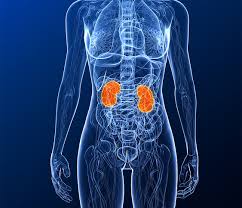In a previous blog, we touched on the liver and how it contributes to our overall health AND emotions. In this post we are going to take it a little lower and chat about the kidneys. From a western perspective the kidneys handle the processing and filtration functions in the body. The National Institutes of Health (NIH) describes the kidneys as two bean-shaped organs, each about the size of a fist. They are located just below the rib cage, one on each side of the spine. Every day, the two kidneys filter about 120 to 150 quarts of blood to produce about 1 to 2 quarts of urine, composed of wastes and extra fluid. The urine flows from the kidneys to the bladder through two thin tubes of muscle called ureters, one on each side of the bladder. The bladder stores urine. The muscles of the bladder wall remain relaxed while the bladder fills with urine. As the bladder fills to capacity, signals sent to the brain tell a person to find a toilet soon. When the bladder empties, urine flows out of the body through a tube called the urethra, located at the bottom of the bladder. In men the urethra is long, while in women it is short. The kidneys are important because they keep the composition, or makeup, of the blood stable, which lets the body function.
Essentially the kidneys:
- prevent the buildup of wastes and extra fluid in the body
- keep levels of electrolytes stable, such as sodium, potassium, and phosphate
- make hormones that
- help regulate blood pressure
- make red blood cells
- bones stay strong
From the perspective of Traditional Chinese Medicine (TCM) the kidneys not only regulate the urinary system but also exercises control over the reproductive, endocrine and nervous systems all of which contribute to hormonal balance. Fusion Health notes that the following are symptoms of low kidney qi (energy) fatigue and exhaustion, weak bones and tendons, reduced sexual vitality and potency, menstrual irregularity, menopause and andropause, night sweats, light-headedness, mild dizziness, tinnitus, knee and leg weakness, lower backache, irritability, insomnia and poor eyesight. So supporting the kidneys and helping them to function with ease is important.
Eating foods like kidney beans, watermelon, pumpkin seeds, blueberries, grapes, and asparagus (to name a few) support our kidneys. Drinking lemon water is an excellent way to flush the kidneys and liver, along with dandelion tea and organic cranberry juice.
It has been shared that the name and shape of kidney beans may suggest which organ benefits most from its healing potential – the kidneys. Kidney beans are known for being an effective home remedy for kidney stones. In ancient times, the pods served as medicinal tonic. I have not needed to try this but I am sure through a little research you could find a way to create the tonic, if needed.
In addition, there are essential oils that provide support to the kidneys.
These oils can be purchased from Young Living, an essential oil distributing company.
JuvaCleanse®

 Grapefruit
Grapefruit
Lemon
Endoflex
Young Living has a blend – K & B™ that is formulated to nutritionally support normal kidney and bladder health.* It contains extracts of juniper berries, which enhance the body’s efforts to maintain proper fluid balance; parsley, which supports kidney and bladder function and aids overall urinary health; and urva ursi, which supports both urinary and digestive system health.* K & B is enhanced with therapeutic-grade essential oils. If interested in purchasing click here to see how.
Love your body. Care for your organs.
The information shared in this article is for educational purposes. It is not to diagnose or treat any illness. As the reader please do your own research (reference the links included), in order to make informed decisions about YOUR health and wellness. ‘
